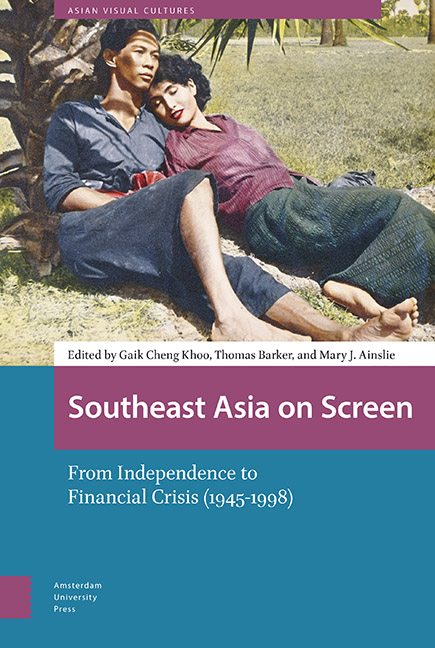Book contents
- Frontmatter
- Contents
- List of Illustrations
- Introduction: Southeast Asia on Screen: From Independence to Financial Crisis (1945–1998)
- Section 1 Independence and Post-World War II Filmmaking: Nation-building, Modernity and Golden Eras
- Section 2 Key Directors
- Section 3 Popular Pleasures
- About the Authors
- Index
5 - Spectacularity of Nationalism: War, Propaganda and Military in Indonesian Cinema during the New Order Era
Published online by Cambridge University Press: 20 November 2020
- Frontmatter
- Contents
- List of Illustrations
- Introduction: Southeast Asia on Screen: From Independence to Financial Crisis (1945–1998)
- Section 1 Independence and Post-World War II Filmmaking: Nation-building, Modernity and Golden Eras
- Section 2 Key Directors
- Section 3 Popular Pleasures
- About the Authors
- Index
Summary
Abstract
This article explores the intricate interlinks between war, propaganda, military and cinema in the context of the Indonesian New Order militaristic regime (1966-1998) characterized by the military intervention in civilian affairs. The New Order war films not only carved out a heroic image of the Indonesian military, it also created a spectacle for a strong nationalistic sentiment regarding the military in comparison to civilians and politicians. Through the narrative modality and visual depiction of armed struggles for independence, many war films embodied an abstract idea of nationalism. While the depiction of armed struggles for independence in such a dramatic way is accorded to the spectacular nature of film, it also substantially renders the civilian struggles for independence through political negotiations (perundingan) insignificant.
Keywords: war film, armed struggle, military, propaganda, nationalism, New Order
Introduction
The early development of cinema during the post-independence era in Southeast Asia is commonly marked by the cinematic depiction of armed struggles against the colonialist regime. Cinema has generally been used strategically ‘to enforce the myth of the unitary nation and to interpellate the textual subject as willing members of the nation’ (Dissanayake 1994, p. xvi). In particular, the framing of World War II tends to be from a national perspective since each nation tells its own stories through its films (Chapman 2008). Indonesian cinema was no exception. The ‘Father of Indonesian Cinema,’ Usmar Ismail, established the first wholly owned Indonesian film company in 1950, a year after Indonesia gained its independence (merdeka) and directed pioneering films depicting the real lives of Indonesians and their struggle for independence. Usmar's first film, DARAH DAN DOA (THE LONG MARCH, 1950) can be understood as part of such a movement in the post-independence era, paving the way for subsequent war film productions in Indonesia.
After the political turmoil in the late 1960s, Indonesian cinema gradually revived with some popular genres such as drama, action and horror (locally called ‘mistik’). There were at least 1640 films produced during the heyday of the New Order regime.
- Type
- Chapter
- Information
- Southeast Asia on ScreenFrom Independence to Financial Crisis (1945–1998), pp. 111 - 128Publisher: Amsterdam University PressPrint publication year: 2020



